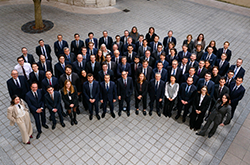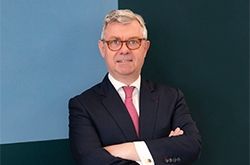Don't we have to run things differently?
In an environment that is rapidly becoming more complex, it is urgent to put Man back at the heart of the system; a certainty for Army General Pierre de Villiers, a keen observer of our contemporary world and its fractures. His experiences of authority and operational management at the highest levels of the French military institution and the State and his many encounters have forged deep convictions which he has agreed to share.
Faced with the changes that are taking place, the human factor embodies success, but should we manage differently? Pierre de Villiers answered our question methodically, starting with an analysis of the new pressure factors on leaders.
The new pressure factors on leaders
A world under tension
Security concerns, economic and social difficulties, the crisis of authority, the shortening of time, digitalisation and globalisation are all constraints on all those responsible. We are indeed evolving in a world under tension in which 2 major lines of conflict can be identified: radical Islamist terrorism combined with the return of power states, which are expressed in particular in the China Sea, the Levant, North Africa (Arab Spring) or even in Eastern Europe with Ukraine.
To this should be added uncontrolled migration, which will have a destructive effect for years to come, and the current geostrategic climate, which worries citizens, disrupts the international influence of companies and mobilises political leaders.
Time is running out, time is stressing
We are witnessing a shortening of the time, time is running out. Our "zapping" society is becoming dehumanized, we no longer have time to exchange with others and are driven by the obsession of immediate satisfaction. In companies, the acceleration of this "time hunt" prevents any reflection and favours tactics to the detriment of strategy. Time is no longer a means but an end. Short time systematically outweighs long time, even though in order to have a long-term vision and translate it into a strategic plan, you need to take the time to think.
Technologism extends
Life is becoming digital, which represents both considerable progress and a risk of exclusion, particularly for older generations. Artificial intelligence proposes a world entirely robotised without human intervention. While science is not bad in itself, it is the use we make of it that can be bad. As I am wont to say, we do not discuss our times, but we shape them, we master them, we channel them.
The crisis of authority: power is slipping away
There is no doubt that we are going through a social crisis of authority. It is increasing the pressure on each of us and more particularly on the managers with responsibility in the city. It must be addressed quickly because it has far-reaching consequences.
Individualism is on the rise
This last factor of pressure on our leaders, undoubtedly the most societal of them, is the result of the others. Indeed, on all strata of society, the "all to the ego" seems to dominate. We live in a country in which we have forgotten that true happiness is brotherhood. We have lost our roots but have found the screens that keep us a little further away. We have entered into a form of "globalisation of indifference". We need to recover the sense of the collective, simply because it alone will save the individual.
To combat these pressure factors, Pierre de Villiers proposes four essential ideas that he calls the keys to acceptance.
The keys to acceptance
Trust is earned
Trust is the first fuel of authority. It alone allows for delegation, accountability, innovation and initiative. It alone makes "friendly obedience" possible, where adherence prevails over coercion. One obeys one's leader because one holds him/her in high esteem. It is the source of commitment and the prerequisite for efficiency, performance and motivation.
Authority
It is neither cold hardness nor warm softness. It avoids stiffness and demagogy. Let us recall that its Latin etymology "autoritas" means to raise towards, to make grow. It rests on two inseparable pillars: humanity that nourishes and firmness that orders. It must be based on 4 stages, the 4 C's:
- Concevoir meaning Conceive… Conceive a project, provide a vision, set the course: the essential prerequisite for motivating people.
- Convaincre meaning Convince… Convince in order to win. This is undoubtedly the least respected stage nowadays but the most important in the army, given the risks taken and the sacrifice of one's life in combat. It requires taking time to explain, to make sure that the person you are talking to listens and understands so that he or she can adhere to and take ownership of the project.
- Conduire meaning Steer… Steering requires the most energy because it is a question of managing hazards without changing course. It also means behaving well.
- Contrôler meaning Monitor… Monitor objectives to make sure their are met and correct any shortcomings.
The strategy
We are sometimes surprised by the lack of strategy in the decisions taken due to a lack of vision. The agenda too often drives the day-to-day business and it is time to regain strategic time.
Leadership
The leader must embody a voice and set the course. Enthusiasm and optimism are essential for this, as are humility and humour. "A sad leader is often an unfortunate leader. Above all, the leader’s most important quality is openness to others, because it makes them a man of responsibility and not a man of power. It engenders benevolence and leads to reconciliation, the breeding ground for true and lasting performance.
On the basis of these observations and his long experience, both military and civilian, Pierre de Villiers makes a number of recommendations to enable the transition from the status of manager to that of leader.
Concrete solutions
A leader must be exemplary, above all
To set the tone, a leader must be credible. A leader must be physically able to make the right decisions.
Intelligence
Too much intelligence sometimes hurts intelligence. It is important to nurture diversity in one's surroundings. Vision is often a matter of common sense.
Heart
When you're a leader, you have to convince, train, motivate. Intelligence and determination are not enough. One must be able to give meaning to action, to put passion, loyalty and generosity in order to convince people.
The duty to sit back
It is essential to know how to be alone with oneself, whatever one's convictions, whatever one's methods... Companies have more and more places dedicated to this meditation, which allows each person to elevate their spirit, nourish their soul and see further.
These four dimensions are inseparable according to Pierre de Villiers, who reminds us that the boss is a man of balance. However, balance is not a quality but rather the state that offers him the stability necessary for his role as a decision-maker, whatever the pressure that is exerted on him. To contribute to this, he believes that the leader must think as a man of action and act as a man of thought. Proximity to the field, consideration for the weakest contribute to this, as well as personal management of his agenda.
It is finally on 3 key words that Pierre de Villiers chooses to insist to encourage women and men to lead differently in a contemporary world in which young people are in search of values, sincerity, fraternity but also consideration, truth and loyalty.
Three tips for leading differently and restoring team spirit
Humanity
The human being must be put back at the heart of the concerns. We must rediscover the intelligence of the heart, the generosity that is very present in our society and that is only waiting to blossom. There is no justification for endorsing the dehumanisation that we are witnessing and which sometimes leaves young people lacking a sense of direction. They need to know that each of us is responsible for our own path and that it is good to succeed in life, but it is better to succeed in life.
Unity
We live in an eminently fractured world. We have forgotten forgiveness, which is one of the roots of our civilisation. Polemics often take the place of benevolence, we have forgotten compassion. It is now necessary to draw a link between generations, to advocate reconciliation and to put all one's talents at the service of unity simply because the collective takes precedence over the individual.
Hope
We live in a great country whose genius is recognised on the outside but sometimes unknown on the inside. I suggest we regain our pride, our talents are many, our history is great, our geography is attractive.
Let us rediscover our hope in the wake of Bernanos' statement that hope is not optimism but "despair overcome".
For further information, we invite you to discover General Pierre de Villiers’ essay, "Qu'est-ce qu'un chef", published in November 2018 by Fayard.
April 16, 2020




